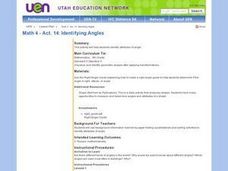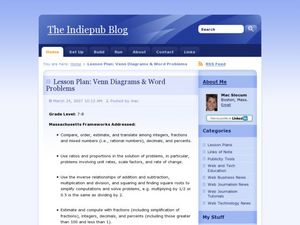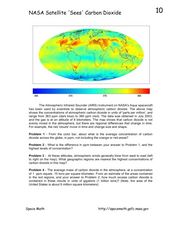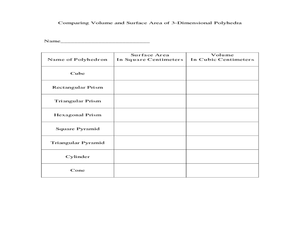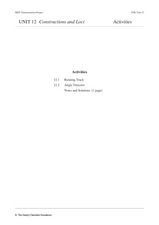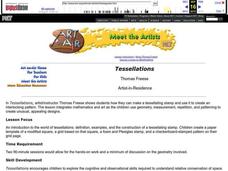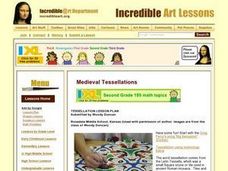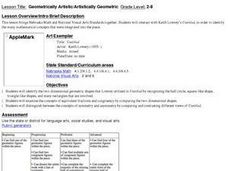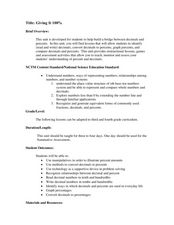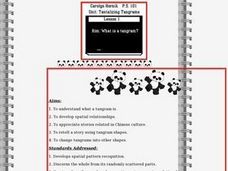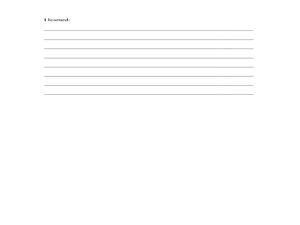Curated OER
Identifying Angles
Fourth graders discuss and examine examples of the different types of angles. After learning the names of the geometric shapes students identify the types of angles and then complete the Kidspiration activity, Identifying Angles.
Curated OER
Venn Diagrams & Word Problems
Students explore the concept of Venn Diagrams through word problems. In this Venn Diagram lesson, students solve word problems about groups of people using Venn Diagrams. Students use survey results about MySpace and Facebook in a Venn...
Curated OER
NASA Satellite 'Sees' Carbon Dioxide
In this atmospheric carbon dioxide activity, students observe a map showing the concentrations of atmospheric carbon dioxide taken by the Atmospheric Infrared Sounder instrument. Students solve 4 problems using the map. They determine...
Curated OER
The Value of Volume
Students measure the perimeter and area of their polygons. In this geometry instructional activity, students calculate the volume and area using the correct tools. They calculate the time and temperature and the perimeter and side...
Curated OER
How Can You Measure This?
Third graders work in small groups to complete a number of investigations in which they have to use measurement. They determine the fractional part of the newspaper that is used for news, sports, etc. They compare their height to their...
Curated OER
Grade 3: What Can I Make with 30 Centimeters?
Third graders create polygons with perimeters of 30 centimeters, use the centimeter grid paper to determine the area of each shape, and organize the shapes to make generalizations from the patterns they see.
Curated OER
Constructions and Loci
In this geometry worksheet, students construct polygons and calculate the different angles formed by each shape. They construct circles, trapezoids, and rectangles and answer 20 questions.
Curated OER
Circles and Cylinders
In this circles and cylinders worksheet, 10th graders solve and complete 22 various types of problems. First, they collect data for a radius and circumference for several different circles and calculate the quantity. Then, students find...
Curated OER
Tessellations
Students learn and review basic geometric terms, definitions, and theory, including regular polygons, lines, angles, points, etc. They make a tessellating stamp and create a repeating work of art.
Curated OER
Pythagoreum Theorem
Learners practice assessing how to apply the formulas for the area of parallelograms and triangles. They recount the contributions of Pythagoras and apply the theories of the Pythagorean theorem in a group project to calculate the...
Helping with Math
Geometry: Areas of Triangles
For this areas of triangles instructional activity, students observe given polygons. They determine the area of triangles, rectangles and compound figures. This one-page instructional activity contains 5 multi-step problems. This...
Curated OER
Investigating Area Using Tangrams
Tenth graders connect the history of geometry to problem solving. In this geometry lesson, 10th graders investigate polygons through hands on manipulatives and solve problems relating to parallelograms and triangles. They calculate the...
Curated OER
Which Triangles are Right
Students apply properties of right triangles to solve problems. In this geometry lesson, students identify axioms and theorems using examples.
Curated OER
Tessellation Lesson Plan
Young scholars produce original tessellations, using equilateral triangles where three unique symmetrical faces rotate, use shape, pattern/repetition, and color to create a striking composition, and create "beasties" inspired by...
Curated OER
Geometrically Artistic/Artistically Geomtric
Students identify the two-dimensional geometric shapes Lowrey utilized in the painting Untitled. Students compare the two-dimensional shapes in terms of equivalent fractions, congruency, symmetry and asymmetry. Students create their own...
Curated OER
Presentation of Quantitative Data- Vertical Line Diagrams
In this quantitative data worksheet, students examine how vertical line diagrams can be used to display discrete quantitative data. They read about the use of tally charts to create vertical line graphs that display the data. They...
Curated OER
Giving it 100%
Students build knowledge about the number relationships between decimals and percents as it relates to converting decimals into percents. In this decimal and percent instructional activity, students recognize equivalent forms of...
Curated OER
Bow Wow, Oink Oink
Students read Everybody Cooks Rice and discuss birthday celebrations around the world. In this cultural differences lesson, students discuss the Chinese symbols by birth years. Students create a graph by symbol. Students display...
Curated OER
Constructing Quadrilaterals
High schoolers investigate quadrilateral construction in this geometry lesson. They use Cabri Jr. to construct the different quadrilaterals from the quadrilateral hierarchy given minimal definitions. The lesson reinforces the difference...
Curated OER
Geometry
In this geometry review game worksheet, students use the provided game cards and calling cards to play a Bingo-like game. Students learn geometric terms while playing a group game.
Curated OER
What is a Tangram?
Students identify a tangram. In this geometry activity, students read Grandfather Tang's Story and retell each story using the tangrams on a flannel board. Students use tangrams to complete an included worksheet.
Curated OER
Heat and Matter
Students explore liquids and solids by conducting in class experiments. In this matter lesson, students define the properties of matter and how heat can change those properties. Students experiment with heating objects such as butter and...
Curated OER
Proving Pythagoras
Students prove the theorem of Pythagoras. In this Pythagorean Theorem lesson, students define the different parts of a right triangle. They use the Pythagorean Theorem to solve for the missing sides and angles of a right triangle.
Curated OER
Multiplying a 3-Digit Number By a Single Digit
In this multiplication activity, learners review steps and solve problems. In this problem solving activity, students find nine products.


